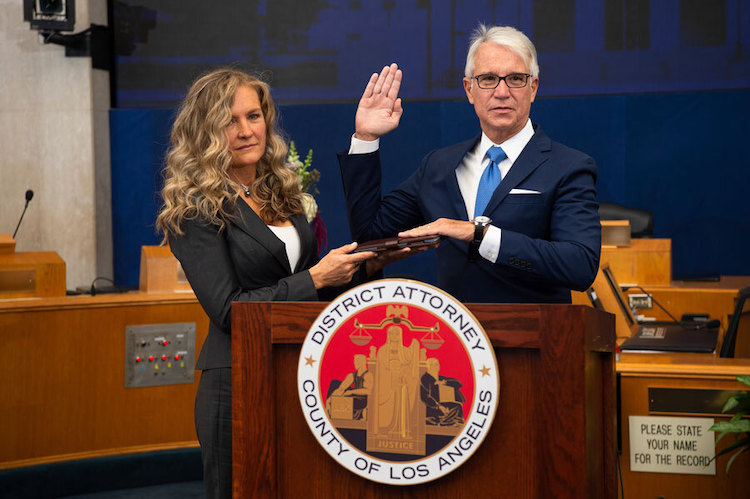USPTO Policy on Director Review of Institution Decisions Does Not Violate Appointments Clause, Says CAFC
“[T]his case fundamentally differs from Arthrex. Here, there is no structural impediment to the Director’s authority to review institution decisions either by statute or by regulation.” – CAFC
The U.S. Court of Appeals for the Federal Circuit (CAFC) today issued a precedential order denying a petition for writ of mandamus filed by Palo Alto Networks (PAN) that asked the court to compel the U.S. Patent and Trademark Office (USPTO) to grant Director Review of the Patent Trial and Appeal Board’s (PTAB’s) decisions not to institute inter partes review (IPR) and post grant review (PGR) of Centripetal Networks’ patents. PAN argued that the USPTO’s policy of refusing to accept requests for Director Review of institution decisions violates the Appointments Clause as set out in United States v. Arthrex, Inc.
While Arthrex held that requests for Director Review of PTAB final written decisions must be available in order to avoid violation of the Appointments Clause, it did not say as much with respect to institution decisions. The statute governing institution decisions bars appeal, and thus mandamus relief may be available “in extraordinary circumstances,” as set forth in Mylan Lab’ys Ltd. v. Janssen Pharmaceutica, N.V., said the CAFC.
The court first explained that while PAN may have in fact forfeited its Appointments Clause challenge by initiating the IPR and PGR proceedings in the first place, it need not address that issue because “courts of appeals may forgive waiver or forfeiture of claims that implicate structural constitutional concerns.” (Ciena Corp. v. Oyster Optics, LLC, 958 F.3d 1157 (Fed. Cir. 2020). The CAFC thus determined that it was appropriate to address the structural constitutional concerns.
Turning to PAN’s argument that the categorical refusal to consider Director Review of institution decisions violates the Appointments Clause, relying on Arthrex, the CAFC said:
“[T]his case fundamentally differs from Arthrex. Here, there is no structural impediment to the Director’s authority to review institution decisions either by statute or by regulation. Indeed, institution decisions are, by statute, the Director’s to make and are only made by the Board as a matter of delegated authority.”
The Director delegated the authority to institute to the PTAB, but still clearly has the right to revoke and review decisions at her discretion, said the court. For example, the Director in June announced that she would sua sponte review the institution decisions in OpenSky Industries, LLC v. VLSI Technology LLC, IPR2021-01064 and Patent Quality Assurance, LLC v. VLSI Technology LLC because the cases “[raise] novel issues of law and policy, as well as issues of particular importance to the Office and the patent community.” The CAFC added:
“The unambiguous identification of the Director as the politically accountable executive officer responsible for institution decisions maintains the clear ‘lines of accountability demanded by the Appointments Clause,’ from the President to the Director, and allows the President to ‘attribute [any] failings to those whom he can oversee.’ Arthrex, 141 S. Ct. at 1981–82 (citation and emphasis omitted). We see no Appointments Clause ‘infirmity in the institution decision as the statute clearly bestows [] authority on the Director.’”
The court cited the Supreme Court’s discussion in Arthrex of the decision in In re Alappat as further support of its position. There, the CAFC explained how a patent applicant at the time could appeal an adverse decision from an examiner to the Board of Patent Appeals and Interferences (BPAI) and seek rehearing, but could not appeal to the commissioner for Patents. However, the Commissioner “retained ‘the ultimate authority regarding the granting of patents’ . . . notwithstanding the lack of a formal appeal from the Board’s decision.”
Several cases both before and after Arthrex throughout other circuits also supported its conclusion, said the court. These include In re Grand Jury Investigation, 916 F.3d 1047 (D.C. Cir. 2019); Willy v. Administrative Review Board, 423 F.3d 483, 491 (5th Cir. 2005); Varnadore v. Secretary of Labor, 141 F.3d 625, 631–32 (6th Cir. 1998); United States v. Donziger, No. 21-2486, 2022 WL 2232222 (2d Cir. June 22, 2022); and Piano Factory Group, Inc. v. Schiedmayer Celesta GmbH, 11 F.4th 1363 (Fed. Cir. 2021).
Reyna: Right Result, Wrong Reasoning
Judge Reyna concurred in the denial of mandamus but for different reasons. He said that mandamus relief simply wasn’t warranted in this case as it is a “drastic and extraordinary remedy reserved for really extraordinary causes.” While Reyna agreed that “categorical denial by the Director to accept any requests for review raises potential constitutional concerns,” he did not find that the facts pointed to such a categorical denial existing. First, the Director’s denial of PAN’s request for review said the Director was not accepting requests for review of institution decisions “at this time”, suggesting that the window is open, and second, the Director subsequently did grant review in the OpenSky and PQA cases. “In my view, the Director’s exercise of discretion to grant review in those two actions pulls the rug out from under PAN’s petition. The agency window is open after all,” Reyna said.
Ultimately, the majority’s analysis lost sight of the specific remedy being requested and didn’t need to reach the constitutional concerns, said Reyna.
USPTO Director Kathi Vidal is presently considering public input on whether to open Director Review requests to institution decisions. In a July Request for Comments, Vidal asked whether requests for Director review should be limited to final written decisions in IPR and PGR and if not, how they should be expanded, and why?
Eileen McDermott
Eileen McDermott is the Editor-in-Chief of IPWatchdog.com. Eileen is a veteran IP and legal journalist, and no stranger to the intellectual property world, having held editorial and managerial positions at […see more]






